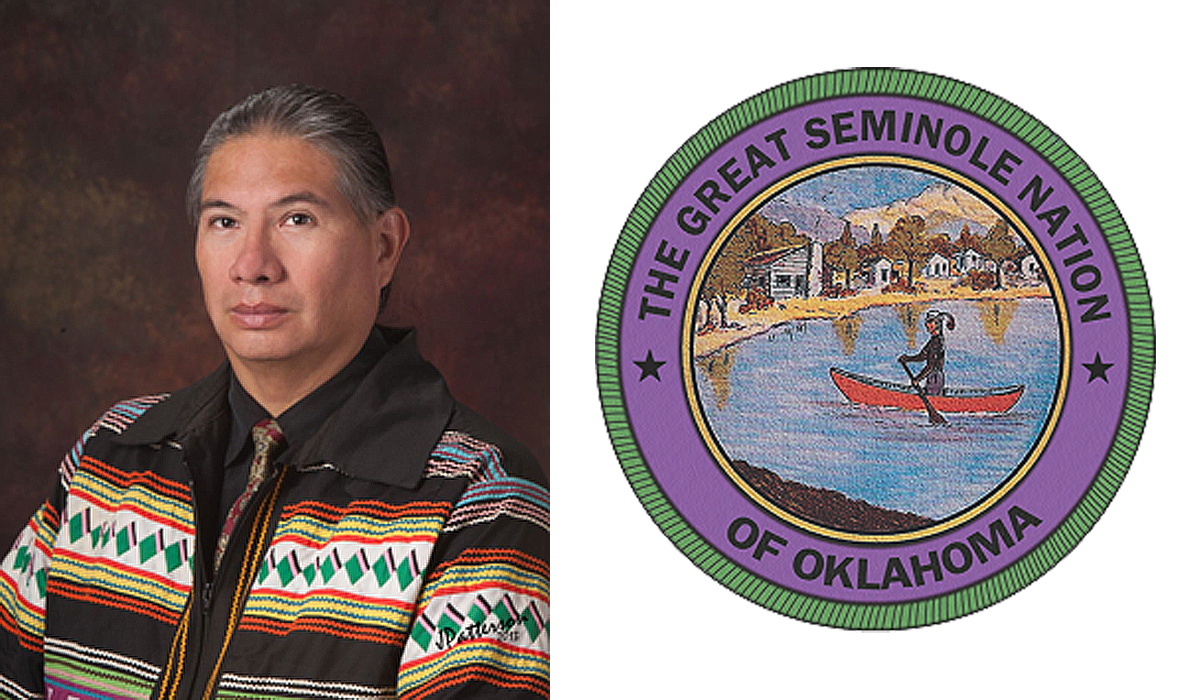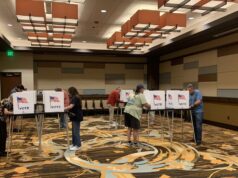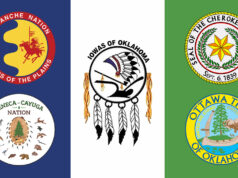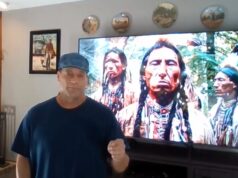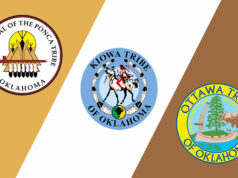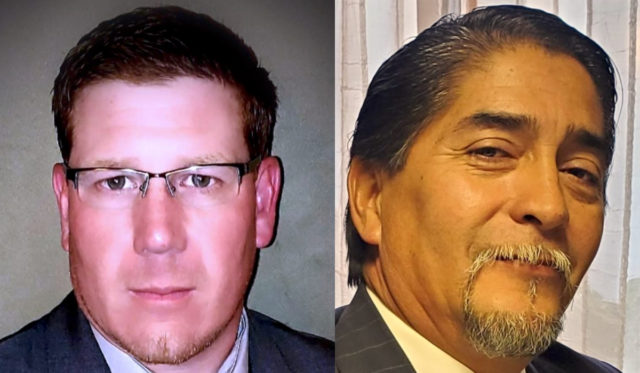

Brian Thomas Palmer and Anthony “Buddy” DeWayne Wood are vying for the assistant chief seat in Saturday’s Seminole Nation of Oklahoma runoff election, but their paths to the ballot differ greatly.
Palmer is a former band chief and assistant band chief of the Tusekia Harjo Band. Wood, meanwhile, is a funeral director and embalmer at Phillips Funeral Service in Holdenville with no previous experience in political office.
Palmer said he believes his political experience offers an advantage over Wood.
“If the plane is going down, you don’t want somebody that just signed up for flight school. You want that veteran flying the plane,” Palmer said. “The lack of involvement I’ve seen from [Wood] scares me to where if he is pushed into that position, is it going to be something that he can just keep his head above water, or actually command?”
Wood, however, said he believes not being a politician will make him an effective liaison for the Seminole Nation.
“I will probably be one of the best liaisons between the county government and the nation’s government, because I know all the people within the county. I know all the surrounding people that hold the major positions,” he said.
The two men finished at the top of a seven-candidate race for assistant chief July 10. Palmer received 372 votes (21.8 percent of 1,708 votes cast), and Wood received 338 votes (19.8 percent). The runoff was triggered since no candidate received more than 50 percent of the votes. The Seminole Nation’s previous assistant chief, Lewis Johnson, defeated incumbent Chief Greg Chilcoat for the tribe’s top executive position.
Polls are open Saturday, Aug. 7, from 7 a.m. to 7 p.m. at five different polling locations. A government-issued photo ID is required to vote.
Gaming and infrastructure differences
While Wood is familiar with folks within the county, he is not familiar with casino gaming.
“Let me put it this way, I’ve never been to any one of our casinos, ever,” Wood said. “I know it’s the mother of our nation. It’s the one that keeps us afloat. But, myself, as a whole, I would like to get away from gaming and would like to go into businesses.”
RELATED
Lewis Johnson ousts Greg Chilcoat as Seminole Nation of Oklahoma chief by Joe Tomlinson
Palmer said he believes the Seminole Nation of Oklahoma needs to invest in current gaming facilities before looking into expansion.
“I think we need to invest in what we already have and stabilize that,” he said. “Not just survive with the three facilities that we have, but we need to invest in them, so that we can provide more services or more activity there.”
Wood did say that, despite not observing for himself, he has heard from community members that Seminole Nation casinos need “revamping”.
“I do know that it’s very important for the existence of our nation. I know what I hear from people, that we need a lot of revamping to our gaming to make it more up to date,” Wood said.
Palmer and Wood are both looking to make a significant impact on the Seminole Nation with the $88 million in funds the tribe received from the American Rescue Plan.
Palmer said he wants the money to provide immediate benefits for tribal citizens.
“First, I do believe (in) — and I don’t have any dollar amount in mind — but direct payments to our tribal citizens,” Palmer said. “I feel like that’s first and foremost.”
Palmer also said he wants the Seminole Nation to invest in water and renewable energy infrastructure.
He noted that water infrastructure is particularly needed at the Mekusukey Mission and in the Sasakwa area. The Sasakwa community’s water system has not been updated since the early 1970s, Palmer said.
“And then energy,” Palmer said. “I think we need to invest in renewable energy, whether it’s wind, whether it’s solar (…) I think those are two long-term beneficial things that we need in order to grow at our Mekusukey Mission ground and just overall as a tribe.”
Wood said he wants to think about the long term and use the funding to kickstart businesses and increase the tribe’s support of education programs and elder assistance.
“Education is a virtue,” he said. “We need to have that to educate our people to make sure we’re ready for the future. We need to have people in place to get them going to vocational schools, colleges, but we need to have our people in the workforce.”
Candidates agree on law enforcement
Wood said his work as a funeral director has given him a unique perspective on law enforcement following the landmark U.S. Supreme Court ruling in McGirt v. Oklahoma.
“I’m involved with the funeral homes, where I go and pick up our tribal members who have perished [in] accidents,” Wood said. “I’ve been out on locations where we wait hours, five hours waiting for [the tribe’s Lighthorse officers] or waiting for release of the FBI police.”
He said there is a need to increase law enforcement within the Seminole Nation and a need for cross-deputization across jurisdictions.
“I understand that people would like to have Indian preference for our Lighthorse,” Wood said. “One thing that we need to understand is that we’ve got to work, coincide, with both county government and our government.”
Palmer echoed Wood’s stance on increasing law enforcement capacity.
“The biggest concern that I have right now is the size of our patrol position,” he said. “Currently, we have 13 positions, and I believe seven or eight of them right now are vacant.”
Another pressing issue Palmer mentioned is the absence of a detention center within the Seminole Nation.
“We’re having to contract to house any of our inmates or anybody like that, that’s been arrested,” Palmer said. “Those are the two biggest obstacles right now — staffing and readily available places to house our inmates.”
Economic development and education
On the topic of economic development within the Seminole Nation of Oklahoma, Palmer reiterated his desire for energy investment, before moving on to broadband infrastructure.
“That’s one thing I think we could invest in throughout the entire boundaries area,” he said. “That would bring income in and also be a great service.”
Palmer said the pandemic showed the need for broadband infrastructure within the Seminole Nation.
“We weren’t prepared with that kind of infrastructure for schooling at home,” he said. “It made it really difficult to provide that service for kids to be able to do their schooling, because the majority of our areas are so rural.”
Wood said he wants to use vacant properties and buildings to develop the nation’s economy.
“This is one of the biggest problems I hear from the people of our nation. We have property that we don’t even use,” Wood said.
Wood referenced property across from Seminole State College that he would like to see a business use.
“I would love to see a cultural center or a convenience store,” Wood said. “I believe we need to get in touch with our people and have informational meetings of how they can be utilized and how to bring businesses to our nation.”
Follow @NonDocMedia on:
Transparency a top priority
Both candidates voiced the importance of transparency within the Seminole Nation and a desire to get more tribal citizens involved in government. Palmer believes that initiative starts with having higher ethical standards.
“I feel like you get that with electing the right people, whether it be at the band level, at the council level or executive level,” Palmer said. “Transparency should not be a campaign tactic, it should be something that’s standardized.”
Wood’s recommendation for providing transparency is simple: “Getting information out where people can see it, and if they have a question, answer it.”
Palmer also expressed support for better communication about the Seminole Nation’s governmental affairs.
“Perhaps have more of, like, a news release so to speak of some of the topics of things that people are interested in,” he said. “And maybe take that extra step to explain it in more of a conversational manner, as opposed to just profit and loss numbers or just a balance sheet.”
(Correction: This article was updated at 2:50 p.m. Sunday, Aug. 8, to remove an incorrect reference to the employment of Brian Thomas Palmer. NonDoc regrets the error.)









